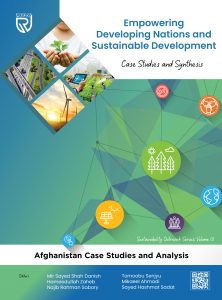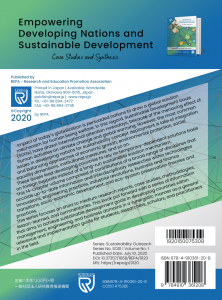Empowering Developing Nations and Sustainable Development: Case Studies and Synthesis (Sustainability Outreach)
Paperback – July 9, 2020
Impact of today’s globalization is persuaded nations to draw a global solution mechanism for human being welfare. In this regard, Sustainable Development Goals (SDGs) have drawn international attention nowadays, because of the menacing effect of human activities on climate change and global warming. However, the most common issues in developing nations for sustainability concept deployment is lake of integration and balancing approaches of economic growth, environmental protection, social equality dimensions, institutional measures, and so on. These issues lead developing countries to rely on temporary-dependent solutions basis on foreign supports instead of a long-run sustainable solution mechanism. Seemingly, a big share of these shortcomings arising from inadequate strategies and policies (in absence of optimum solutions through research and analysis), which are shaping the future of developing countries.
The 2030 Agenda for SDGs principally encompasses humanity and our planet challenges, consisting of 17 main goals and 169 sub-targets. For developed nations, implementing the SDGs 2030 and achieving target millstones would be an easy task. Whereas, developing countries encounter knotty challenges to practice the SDGs 2030 milestones, and attain the goals. From the vulnerability point of view in the 21st century, the world becomes likely a small village with counter interactions and impacts.
Prevailing endeavors towards global collaboration has been put forward. Contribution to the SDGs deployment has dramatically increased over the past years. In the context of global contribution, for the first time, Kabul University in collaboration with University of the Ryukyus, Rahkaar Research and Education Organization and many more national and international organizations creates an international forum to discuss and share knowledge for effective deployment of the SDGs goals within viable models, scenarios, and best worldwide accepted practices in developing countries. Since, this International Conference was hosted by Kabul University, therefore mostly topics presented in the context of Afghanistan with the isochronous image of deployment for other developing countries.The SODCs conferences series aims to establish a global dialogue on Sustainability Outreach that brings together scholars, researchers, and field practitioners to facilitate global networking for reaching optimum and sustainable solutions.
SODC-2019 discussed transboundary researches, experiences, case studies, and lessons learned, covers conceptual and empirical research contributions within the scope of the conference. That offers viable options for societies transition in the 21st century for (1) a well-being life to eradicate poverty, (2) mitigate climate change, (3) promote lifelong learning opportunities, (4) empower sociality, (5) deploy affordable energy, (6) sustain economic growth, (7) offer innovation, (8) reduce inequality, (9) ensure global sustainability and so on.




